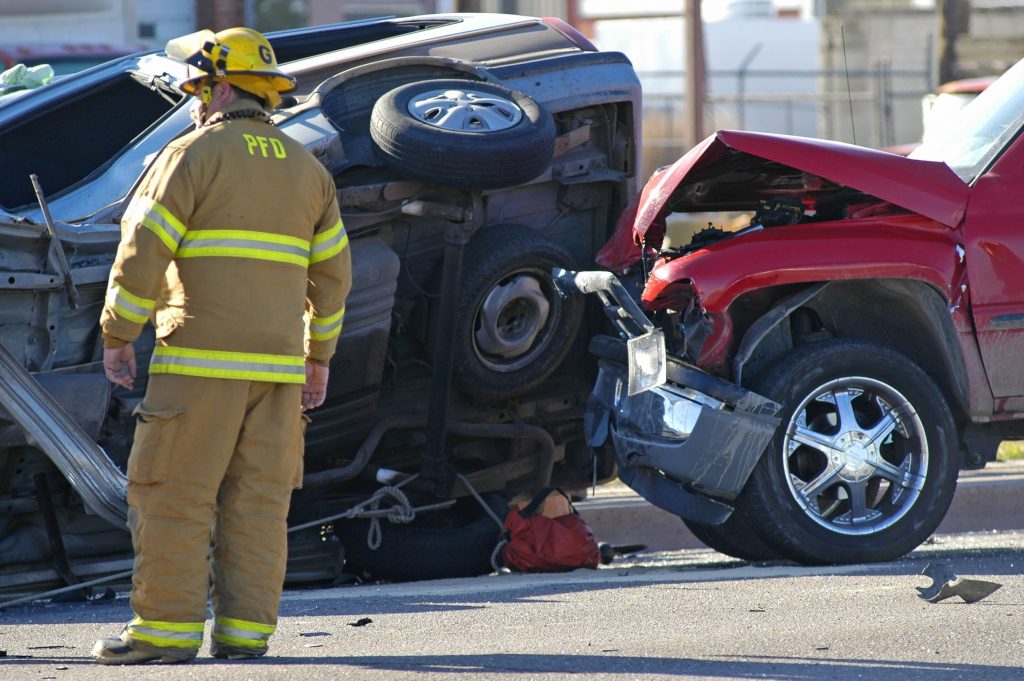
According to the National Highway Traffic Safety Administration (NHTSA), there were 7,170 fatal rollover accidents in 2019 throughout the U.S., representing about 21.6% of all passenger vehicle occupant deaths that year. Although rollover accidents aren’t the most common type of car accident, they often lead to some of the most serious and catastrophic injuries.
Knowing what causes rollover accidents can help motorists take preventative measures to avoid them. What’s more, understanding what factors and driver errors contribute to a rollover can help injured victims obtain the compensation they deserve after an accident. Learn more about the characteristics and causes of Las Vegas rollover accidents from ER Injury Attorneys.
Most Rollovers Are Single Vehicle Accidents
Data from the NHTSA indicates that more than 75% of serious injury and/or fatal rollover accidents are single-vehicle accidents—that is, those which are not preceded by an impact with another vehicle. Common causes of single-vehicle rollovers include driving under the influence of drugs or alcohol and speeding (particularly when negotiating a curve in the road).
That being said, another driver’s negligence could also be to blame for a single-vehicle rollover. For example, if a driver crosses over the median on a two-way road, forcing you to swerve, lose control of your vehicle and roll, they could be found at fault for the accident even though they didn’t hit you.
Mechanisms of Multi-Vehicle Rollover Accidents
Although multi-vehicle rollover accidents make up less than 25% of all rollover crashes, they still result in thousands of injuries and deaths every year throughout the United States. In Nevada alone, 683 people have died in rollover accidents in the past decade. The most common mechanisms of multi-vehicle rollover accidents are as described below.
Angled Collisions
Roughly 42.3% of fatal multi-vehicle rollover accidents between 2015 and 2019 were preceded by angled collision, as were 53.6% of injury only rollovers. These types of crashes occur when two vehicles collide at an angle, such as a t-bone collision. Angled collisions may occur when a driver runs a red light, stop sign, or yield sign, or when they change lanes without looking. Speeding is a common factor in rollover accidents caused by an angled collision.
Head-On Collisions
Head-on collisions lead to about 24.4% of fatal rollover accidents, and about 5.7% of injury only rollover accidents. Even before a vehicle rolls or tips, head-on collisions can produce some of the most serious and life-threatening injuries, especially to drivers or front seat passengers who bear the brunt of the impact. Head-on collisions are most likely to occur on two-way roads or highways with no barrier, and may occur when one driver is under the influence of alcohol, distracted, or falls asleep and crosses over the median. Speed is often a factor as well.
Rear-End Collisions
At high speeds, getting rear-ended by another vehicle can lead to a rollover accident of either the front or back vehicle. Being rear-ended precedes about 18.3% of fatal rollover accidents and about 19.2% of injury rollovers. Rollovers are more likely to happen if the back vehicle tries to swerve out of the way but still hits the back of the other vehicle at an angle. Rear-end collisions generally occur when the back driver is following too closely or is distracted, but they can also be caused by the lead driver if they suddenly change lanes without signaling.
Sideswipe Collisions
Rollover accidents can also happen after a sideswipe collision. The NHTSA found that this is the case in about 13.2% of fatal rollovers and 21% of injury rollover accidents. Sideswipe accidents occur when one vehicle strikes the driver or passenger side of another car, motorcycle, SUV, van, or semi-truck. Sometimes referred to as blind spot accidents, they often happen when changing lanes. Sometimes the impact of the collision leads to the rollover, while other times one or both of the drivers’ attempts to swerve out of the way lead to their vehicle tipping or rolling over.
Vehicle Defects
Rollover accidents are more likely to occur in certain vehicles with a higher center of mass, such as SUVs, vans, pickup trucks, and semi-trucks. While this may be an inherent risk of driving certain types of vehicles, some rollovers may be partially or entirely caused by a vehicle design flaw. In addition, some vehicles with faulty or poorly-designed roofs may provide insufficient protection to passengers in the event of a rollover accident. If you suspect your accident or injuries may be linked to a defective vehicle or part, the manufacturer could be to blame.
Legal Help After a Las Vegas Rollover Accident
Rollover accidents can have devastating consequences, including serious neck, spine, and head injuries. In severe accidents, drivers or passengers may even be ejected from the vehicle, resulting in death. If you or a loved one have been in a Las Vegas rollover accident through no fault of your own, you could be entitled to significant compensation for losses such as medical bills, lost wages, pain and suffering, and more. However, in order to secure a fair settlement, you’ll need to prove that another driver’s negligence led to your injuries.
Even when liability is clear cut, you may still face challenges negotiating with the insurance company. An experienced personal injury attorney can assist you every step of the personal injury claim process, from calculating the true value of your claim to settling your case in or out of the courtroom.
How ER Injury Attorneys Can Help
For a free case review of your rollover accident, contact ER Injury Attorneys today. Our legal team will arrange a no obligation consultation to go over the details of your accident and discuss all your legal options moving forward. Should you decide to move forward with our services, you won’t pay us a penny unless we make a financial recovery on your behalf.
Contact us today by calling 702-878-7878. Representatives are available 24/7 to assist you. You can also connect with an agent online via LiveChat, or tell us about your case by filling out this form.